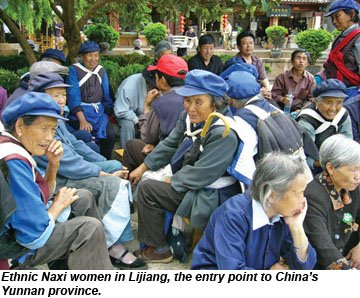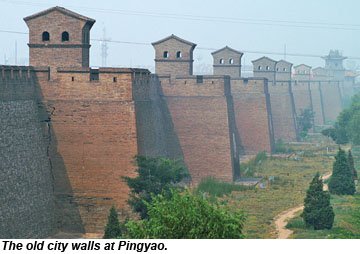
Frosch Travel's Karin Hansen, who has been a China travel specialist for the last decade, says she is seeing a growing interest among her clients in visiting the more remote areas of China, places clients weren't so likely to visit when she first sold the destination.
On the other hand, the evolution in the interests of her clients, many of whom are repeat visitors, is being driven by Hansen herself, a 34-year industry veteran based in Deerfield, Ill.
"I'm doing the recommending," she said. "Clients want these options [to visit less-typical destinations] too, but they don't know it until they talk to me."
So, what does she recommend?
• Lijiang is the entry point to Yunnan, a province noted as the home to many of China's ethnic minorities. Hansen said the city is in the mountains, "a beautiful area where clients can hike and bike and visit villages." It is home to the Naxi people.
 The Lijiang Old Town, a Unesco World Heritage Site, is described by the organization as "a historic townscape of high quality and authenticity," boasting a still-functioning ancient water supply system "of great complexity and ingenuity."
The Lijiang Old Town, a Unesco World Heritage Site, is described by the organization as "a historic townscape of high quality and authenticity," boasting a still-functioning ancient water supply system "of great complexity and ingenuity."
Lijiang has become very popular, Hansen continued, and the amount of tourists, including the Chinese themselves these days, is becoming "a bit of an issue," but she still recommends it.
• Shangri-La, formerly Zhongdian, is another town in Yunnan province, near the Tibetan border. It has its own minority residents, including Tibetans. This area is also beautiful, Hansen said, "but not the town."
• Dali is also in Yunnan but situated on Erhai Lake. Clients will meet "lots of ethnic peoples" here, too, Hansen said, but she recommends this spot as an alternative to cruising for those who need a restful pause in their itineraries.
• The Huangshan Mountain range, located southwest of Shanghai, is in Anhui province. This is a new one on Hansen's list because it was on her itinerary during a just-completed trip to China.
Huangshan Mountain is a Unesco World Heritage Site, acclaimed through much of Chinese history for the beauty of its "many granite peaks and rocks emerging out of a sea of clouds," according to Unesco.
Hansen said the scenery at Huangshan is "amazing," somewhat comparable to the mountains at Guilin. But at Huangshan, she said, visitors "walk in the mountains and see authentic old villages." The area, she said, "has not been taken over by tourism; there are no other Westerners around. The villages are authentic, and that is big for me."
 She added there are "no phenomenal hotels" at Huangshan, and "not all clients will accept that."
She added there are "no phenomenal hotels" at Huangshan, and "not all clients will accept that."
• Pingyao is a city in Shanxi province, southwest of Beijing. It boasts a historical walled city center, which also is on the list of Unesco World Heritage Sites. According to Unesco, Pingyao is "an exceptionally well-preserved example of a traditional Han Chinese city, founded in the 14th century." The city was the major banking center for China in the 19th and early 20th centuries.
Shanxi province also is China's coal mining center, and, Hansen added, Pingyao is "dirty, covered with coal dust, but it is fascinating." If clients want only beauty, the Denmark-born Hansen suggests they "go to Norway."
< color: rgb(0, 0, 0); text-transform: none; text-indent: 0px; letter-spacing: normal; word-spacing: 0px; white-space: normal; orphans: 2; widows: 2; background-color: rgb(230, 227, 220); -webkit-text-size-adjust: auto; -webkit-text-stroke-width: 0px;" />
Hansen said she "sells everything," but about 75% of her business is to China and Southeast Asia, mostly at the high end. She does not sell budget trips, she said.
She may be European by birth, but Hansen turned her attention to China because her daughter moved to Beijing at age 22 and stayed more than 15 years. Therefore, the China trips began in the friends-and-family category, but Hansen said she always saw more than the capital.
She added new destinations and experiences with each trip over the years, finally covering more than 90% of areas visited by tourists, she said, and "generally ahead of the curve." By now, she has seen much of the touristic area more than once.
In the past decade, Hansen has appeared twice on Conde Nast Traveler's list of top agents and 10 times on Travel + Leisure's list. She also appears with a list of China experts published online by Beijing-based luxury operator Imperial Tours, except her name appears first, as a master scholar, reflecting all the time she has spent in the country.
Hansen said she met Imperial's founders, Guy Rubin and Karen Kim, soon after they launched their business in 1999 because her daughter had met them first. But she was on an early fam trip and now relies on Imperial (as well as Asia Pacific Travel in Wilmette, Ill.) to handle all her China business.
She said that "everything Imperial does is just about flawless," that the founders "check everything out personally." Almost every trip is escorted throughout even if the "group" is a couple, she said.
 In addition, Hansen said, the company provides access to unique experiences, whether a conversation with nuns in Tibet or a visit to an archaeological dig near Xian.
In addition, Hansen said, the company provides access to unique experiences, whether a conversation with nuns in Tibet or a visit to an archaeological dig near Xian.
Another unique offering, she said, is a lunch on the Great Wall, which is "something else."
On the other hand, she said, there is one thing Imperial does not do: It doesn't take clients to shops where a guide may earn a commission if the customers make purchases.
Hansen said that when operators take clients to commission-based shops in China, a cut for the guide is the norm and sometimes ground operators get a piece of the action, too, likely raising the prices for customers. (On the other hand, she noted, having a guide on hand when shopping does occur has its upside, because guides can assist with price negotiations and prevent real rip-offs.)
However, when it comes to the choice of shops, Hansen said neither of the operators she uses permits guides to take clients to commission-based businesses.
For her, this is one case where omissions are as important as the inclusions.